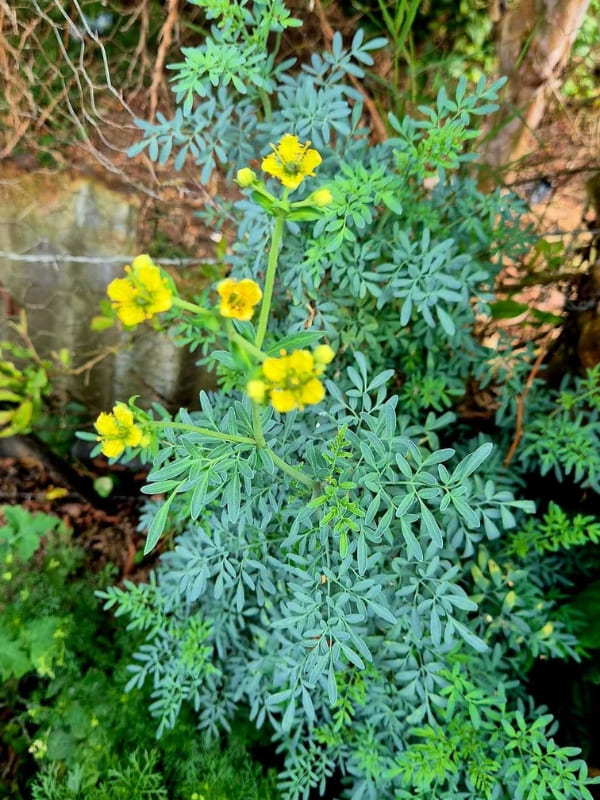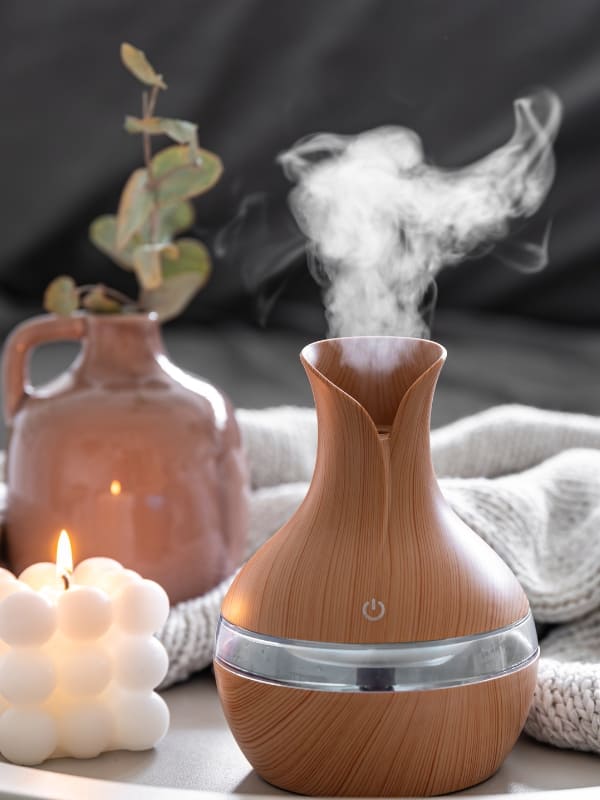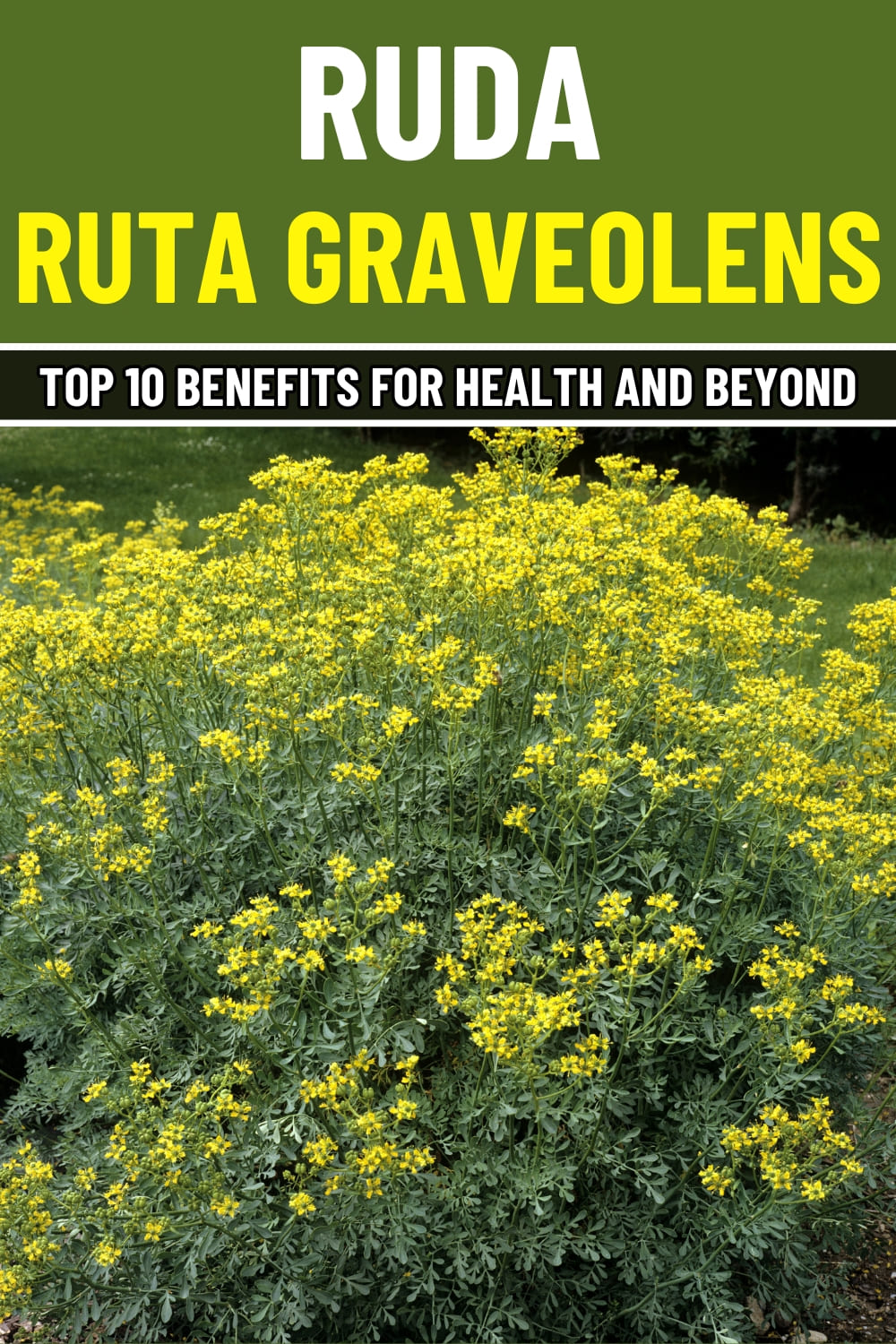Ruda (Ruta graveolens), commonly known as rue, is a remarkable herb that has been cherished for centuries for its medicinal and cultural significance.
Native to the Mediterranean region and widely cultivated around the globe, this aromatic plant boasts a variety of health benefits that align with both traditional practices and modern wellness needs.
Its therapeutic potential is matched by its unique uses in spiritual rituals, making Ruda an all-encompassing herb worthy of exploration.
#1. Supports Digestive Health
Ruda has long been valued for its ability to ease digestive discomfort. The herb stimulates the production of gastric juices, aiding in the digestion of food and alleviating common issues like indigestion, bloating, and cramps.
The bitter compounds in Ruda promote bile flow and enhance gut motility, making it an effective remedy for sluggish digestion. A mild Ruda tea can soothe stomach upset and improve overall digestive function.

#2. Eases Menstrual Cramps
Ruda is highly regarded for its ability to alleviate menstrual pain and regulate irregular cycles. Its natural muscle-relaxing properties help ease uterine cramps and relieve discomfort during menstruation.
A study published in Phytotherapy Research (2012) highlighted that the plant’s bioactive compounds exhibit significant muscle-relaxing effects, supporting its traditional use for menstrual distress.
Thanks to its anti-spasmodic properties, Ruda can be a valuable ally for women dealing with period discomfort. However, it’s essential to use it with caution, as excessive doses may lead to uterine contractions.
#3. Relieves Stress and Anxiety
Ruda’s calming properties make it a natural solution for managing stress and anxiety. Its soothing aroma and mild sedative effects can help unwind the mind and body.
Brew a light infusion of Ruda leaves or diffuse Ruda essential oil to create a relaxing atmosphere. Incorporating this practice into your evening routine can promote better sleep and reduce tension.

#4. Promotes Detoxification
Ruda acts as a natural diuretic, helping the body eliminate toxins and excess fluids. By supporting kidney function, it aids in cleansing the system and promoting a sense of lightness.
The herb encourages urination, which helps flush out waste products. Regular but moderate consumption of Ruda tea can enhance your body’s detox processes.
#5. Provides Pain Relief
The anti-inflammatory properties of Ruda make it effective for managing pain caused by arthritis, muscle soreness, and injuries. When applied topically, it can provide localized relief.
The herb contains natural compounds that reduce inflammation and improve blood circulation, alleviating discomfort in affected areas.

#6. Improves Respiratory Health
Ruda is often used to address respiratory issues such as coughs, colds, and congestion. Its expectorant properties help clear mucus and soothe irritated airways.
A warm Ruda tea or steam inhalation infused with Ruda leaves can provide immediate relief from respiratory discomfort, especially during seasonal changes.
#7. Supports Heart Health
By improving blood circulation and reducing blood pressure, Ruda contributes to cardiovascular health. Its vasodilatory properties ensure that blood flows efficiently, reducing strain on the heart.
The herb’s antioxidants and bioactive compounds protect blood vessels, minimizing the risk of cardiovascular issues.

#8. Combats Skin Infections
Thanks to its antibacterial and antifungal properties, Ruda can be used to treat minor skin infections, acne, and rashes. When applied topically, it promotes healing and reduces irritation.
Create a Ruda-infused water solution or dilute Ruda essential oil in a carrier oil for safe application on the skin.
#9. Repels Insects
The strong aroma of Ruda makes it an effective natural insect repellent. It’s particularly useful in keeping mosquitoes, flies, and other pests at bay.
Place fresh Ruda leaves near windows and doors, or use a homemade spray made with Ruda oil to create a pest-free environment.

#10. Aids Spiritual Well-Being
In many cultures, Ruda is revered for its spiritual properties. It is believed to cleanse negative energy, ward off bad luck, and promote positive vibes.
Burn dried Ruda leaves or place them in small sachets around your home to create a calming and protective atmosphere.
How to Use Ruda Safely
- Ruda tea: Brew 1 teaspoon of dried Ruda leaves in 1 cup of boiling water. Let it steep for 5–7 minutes, strain, and enjoy. Consume no more than twice a day to avoid overuse.
- Topical application: Dilute 5 drops of Ruda essential oil in 2 tablespoons of carrier oil. Massage gently onto the affected area to relieve pain and reduce inflammation.
- Aromatic use: Add a few drops of Ruda essential oil to a diffuser or burn dried leaves to enhance relaxation and purify your environment.

Cautions and Precautions
Pregnant women should avoid Ruda, as it can cause uterine contractions and potentially lead to complications.
Additionally, it is essential to always dilute Ruda oil before applying it to the skin to prevent irritation or adverse reactions.
Using Ruda in moderation is crucial, as excessive consumption can result in digestive discomfort or other unwanted effects.
Lastly, proper identification of the plant is vital to avoid confusion with similar species that may be toxic, ensuring that you reap the benefits of Ruda without any risks.
Disclaimer
This article is intended for informational purposes only and does not substitute for professional medical advice.
Always consult a qualified healthcare provider before incorporating Ruda into your health routine, especially if you are pregnant, nursing, or on medication.

10 Incredible Benefits of Ruda: Ancient Remedy for Modern Health
